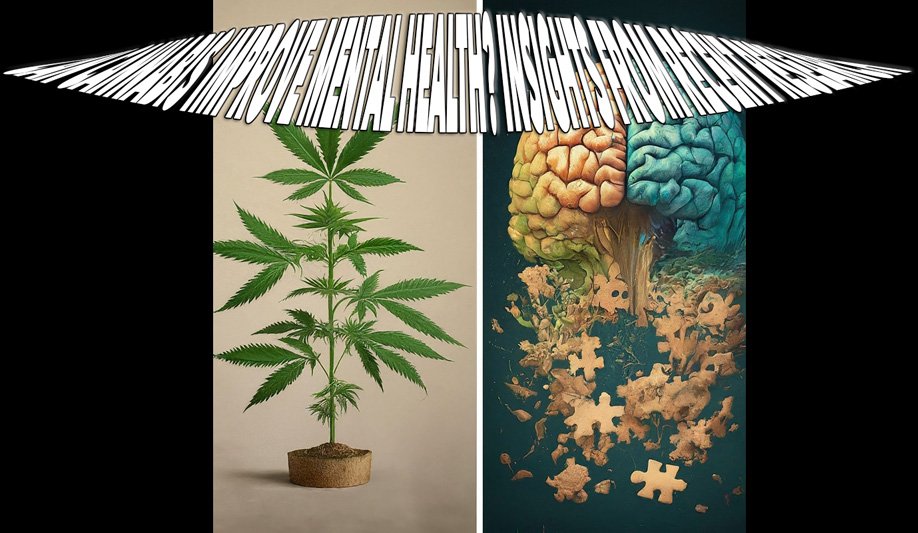Table of Contents [show]

With cannabis legalization spreading across North America, you may be wondering if lighting up can ease your stress or anxiety. Researchers have been working to uncover the truth. Early studies show components of cannabis can benefit certain mental health conditions.
However, risks remain, especially for adolescents and those predisposed to psychosis. By examining recent scientific studies, this article provides insights into the complicated relationship between cannabis and mental health. Weighing potential therapeutic effects against proven harms can help you make an informed decision about using cannabis to self-medicate.
The Complex Relationship Between Cannabis and Mental Health
Recent research indicates cannabis may have some benefits for certain mental health conditions, though the relationship is complex. Cannabis contains compounds called cannabinoids, particularly THC and CBD, which interact with the body’s endocannabinoid system involved in regulating mood, pain, and other functions.
Anxiety and Depression
Some studies show cannabis may temporarily reduce symptoms of anxiety and depression, though long-term effects are unclear. A 2020 review found some evidence cannabis with higher CBD and lower THC could have antidepressant effects, but frequent use may worsen symptoms.
PTSD
Cannabis may help reduce PTSD symptoms like nightmares or flashbacks in the short term. A 2020 study found PTSD patients who used cannabis reported improved sleep, decreased anxiety, and less severe and frequent PTSD symptoms. However, cannabis may impair memory and worsen symptoms like hyperarousal or emotional numbing with long-term use.
Bipolar Disorder
While some report cannabis eases symptoms of bipolar disorder like anxiety or insomnia, it may trigger or worsen mania or psychosis in some users. A 2019 review found little evidence to conclusively support the use of cannabis to treat bipolar disorder, though CBD-dominant strains appear safer than THC-dominant ones.
Overall, research on cannabis and mental health shows promise for some conditions but also risks and uncertainties, especially with long-term use. If considering medical cannabis, patients should consult doctors to weigh the pros and cons based on their unique situations and mental health needs. With further research, cannabis may prove an effective treatment for certain individuals and disorders, though more data is still needed.
Cannabis and Anxiety: What the Research Shows
Recent studies suggest that cannabis may help alleviate anxiety for some individuals. According to a review of 31 studies on cannabis and anxiety published in the journal Clinical Psychology Review, many studies found that cannabis use was associated with a reduction in anxiety symptoms. Specifically, the studies found that low doses of tetrahydrocannabinol (THC), the main psychoactive compound in cannabis, reduced anxiety.
However, the research also found inconsistent results, with some studies showing no effect or even increased anxiety from cannabis use. The mixed findings suggest that the impact of cannabis on anxiety likely depends on many factors, including dosage, cannabis strain, individual differences, and the nature of the anxiety disorder. For example, a study published in the Journal of Affective Disorders found that while low doses of THC reduced anxiety, higher doses actually increased anxiety symptoms in some chronic anxiety patients.
The method of ingesting cannabis may also play a role. According to a study in the Journal of Psychopharmacology, oral administration of cannabidiol (CBD) oil, a non-psychoactive compound in cannabis, reduced anxiety in patients with social anxiety disorder, while inhaled cannabis did not have the same effect. The oral CBD oil was found to have anxiolytic effects, meaning it reduced anxiety.
In summary, while some research shows the potential for cannabis to help alleviate anxiety, the evidence is mixed and highly dependent on the individual and dosage. More rigorous clinical trials are still needed to determine how and for whom cannabis may have therapeutic effects on anxiety. If you do suffer from anxiety, you should talk to your doctor before experimenting with cannabis as a form of treatment.
Cannabis and Depression: Potential Benefits and Risks
Recent studies have explored the relationship between cannabis use and depression. While some research suggests cannabis may help alleviate symptoms of depression, other evidence indicates it could worsen the condition or even trigger depressive episodes in some individuals.
Several studies have found that cannabis use is linked to a higher risk of developing depression or cannabis use disorder. According to a large longitudinal study following over 34,000 adults, cannabis use was associated with a modest increased risk of developing depression or a cannabis use disorder over the following decade. The risks were higher for frequent or heavy users.
However, other research suggests cannabis may have antidepressant effects for some. A review of clinical trials found that cannabidiol (CBD), a compound in cannabis, may have therapeutic potential for the treatment of depression. And a study found that medical cannabis users with depression reported their symptoms decreased with cannabis use.
The mixed findings suggest that cannabis’ impact on depression depends on the individual and other factors like dosage, cannabinoid content, and frequency of use. If used occasionally and in moderation, cannabis may help alleviate symptoms for some. However, frequent or long-term use, especially of high-THC strains, could worsen depression or increase the risk of other mental health issues.
In summary, while limited research suggests cannabis may have some antidepressant effects, the risks of depression and other issues from long-term or heavy cannabis use outweigh the potential benefits for mental health.
More research is still needed to determine how and for whom cannabis could be used to safely and effectively treat depression. But at this time, cannabis cannot be recommended as a treatment and may do more harm than good.
Cannabis for PTSD: Evidence for Therapeutic Effects
Neurological Basis for Relief from PTSD Symptoms
Research suggests cannabis may help alleviate PTSD symptoms by impacting the endocannabinoid system, which regulates various physiological processes. Studies show people with PTSD have altered endocannabinoid system functioning. Cannabis engages the endocannabinoid system, which could help restore balance and ease PTSD symptoms.
Cannabis Reduces PTSD-Related Nightmares and Insomnia
Many people with PTSD struggle with chronic nightmares and insomnia. According to recent studies, cannabis appears effective at reducing the frequency and intensity of PTSD-related nightmares and improving sleep quality. For example, a study found over 75% of participants reported fewer nightmares and improved sleep with cannabis. The calming and anxiety-reducing effects of cannabis are likely responsible for these benefits.
Cannabis Decreases Symptoms of Hyperarousal and Flashbacks
PTSD involves symptoms of hyperarousal, like irritability, difficulty concentrating, and hypervigilance as well as flashbacks. Research shows cannabis can decrease these symptoms. A study found over 60% of participants experienced moderate to significant decreases in hyperarousal and flashbacks. The relaxing properties of cannabis are thought to be responsible for easing these symptoms.
Mixed Evidence for Effects on Emotional Numbing and Withdrawal
While some studies have found cannabis may decrease emotional numbing, a core symptom of PTSD, the research is mixed. Emotional numbing involves feeling detached or estranged from others. Additional research is still needed to determine cannabis’ effects on this symptom. There is also limited and mixed evidence on whether cannabis helps with withdrawal and avoidance. More studies are required to draw definitive conclusions.
In summary, recent research provides promising evidence that cannabis may effectively relieve PTSD symptoms like nightmares, insomnia, hyperarousal, and flashbacks. However, additional research is still needed to determine its effects on other symptoms like emotional numbing and withdrawal. Overall, cannabis appears to hold therapeutic potential for PTSD, but more studies are required to confirm its benefits and risks. Individual experiences with cannabis for PTSD also vary. As with any treatment, a doctor should always supervise the use of cannabis for medical purposes.
Cannabis and Psychosis: Assessing the Link
Research on the relationship between cannabis use and psychosis suggests a link between the two, though the nature of this association remains unclear. According to recent studies, cannabis may act as a risk factor for developing psychosis or exacerbating existing psychotic disorders.
A 2020 study published in The Lancet found that individuals who use cannabis have a higher risk of developing psychosis compared to those who do not use the drug. The risk is highest for frequent users and those who start using cannabis at a young age. However, the authors note that “the exact mechanism through which cannabis leads to psychosis is not fully understood.” While cannabis use may be a risk factor, additional research is needed to determine if it directly causes psychosis.
Conversely, some research indicates that cannabis may help relieve psychotic symptoms for some individuals. A 2014 study found that CBD, a non-intoxicating compound in cannabis, has antipsychotic effects and may be used to treat schizophrenia. Patients in the study experienced reduced psychotic symptoms and improved cognition and functioning. However, further research is needed to confirm these findings before cannabis can be recommended as a treatment for psychosis.
The relationship between cannabis and psychosis is complex with many open questions. On the one hand, frequent and long-term cannabis use, especially starting at a young age, seems to increase the risk of developing a psychotic disorder or experiencing a psychotic episode.
On the other hand, certain compounds in cannabis may alleviate psychotic symptoms for some individuals. Given the risks and uncertainty, most experts do not recommend using cannabis if you have been diagnosed with a psychotic disorder or experience psychotic symptoms. Until more is known, caution and moderation are advised.
Cannabis and Bipolar Disorder: Mixed Results
Bipolar disorder is a mental health condition characterized by extreme mood swings, ranging from depressive lows to manic highs. Some research has explored whether cannabis may help stabilize mood and ease symptoms in those with bipolar disorder. However, the evidence is mixed and inconclusive.
Some studies have found that cannabis may have therapeutic effects for certain symptoms of bipolar disorder. A 2019 review noted that cannabis use was associated with decreases in mania and psychosis, as well as improvements in cognition and quality of life for some patients. Similarly, a 2020 study found that patients with bipolar disorder who used cannabis reported decreased severity and frequency of manic episodes.
However, other research has found either no benefit or even harm from cannabis use for those with bipolar disorder. A large 2020 study found no association between cannabis use and mood symptom severity in bipolar disorder. Some studies have found that cannabis use may worsen symptoms or increase the risk of psychosis in those with bipolar disorder.
The mixed and conflicting nature of these findings highlights the need for larger, more rigorous clinical trials on the effects of cannabis for bipolar disorder. As with any treatment, cannabis may affect individuals differently based on factors like dosage, cannabinoid content, and personal physiology. Patients should consult their doctor before using cannabis to manage bipolar disorder symptoms.
In summary, while some promising research has found potential benefits of cannabis for bipolar disorder, the evidence is limited and inconsistent. More research is still needed to determine if and how cannabis could be used safely and effectively in the treatment of this serious mental health condition.
Responsible Cannabis Use for Mental Health
Recent scientific studies have explored the relationship between cannabis use and mental health. While cannabis may provide relief for some conditions, responsible and moderated use is key to maximizing benefits and minimizing harm.
Cannabis for Anxiety and Depression
Several studies show cannabis may alleviate symptoms of anxiety and depression for some individuals. A review of research found certain cannabis compounds have anti-anxiety and antidepressant effects. However, cannabis use disorder itself has been linked to an increased risk of anxiety and depression.
Responsible use involves understanding the risks of cannabis use disorder and avoiding frequent or high-potency THC products.
Cannabis for PTSD and Insomnia
Cannabis may also provide relief for PTSD and insomnia. A study found PTSD symptoms improved with medical cannabis use. Another study showed cannabis helped veterans with PTSD sleep better and experience fewer nightmares. However, irresponsible use of high-potency THC cannabis for sleep can worsen insomnia and mental health over time. Those with PTSD should only use cannabis under guidance from a medical professional.
Schizophrenia and Psychosis Risk
While cannabis may benefit some conditions, it can worsen symptoms of schizophrenia and increase the risk of developing psychosis. Adolescents who use cannabis are more likely to develop schizophrenia later in life. Frequent use of high-potency THC cannabis can induce psychotic episodes in those with schizophrenia. If you have been diagnosed with schizophrenia or are at high risk, cannabis use should be avoided.
In summary, cannabis shows promise for certain mental health conditions when used responsibly under guidance from a medical professional. However, irresponsible or high-frequency use of high-potency THC cannabis can worsen anxiety, depression, insomnia, and psychosis or induce cannabis use disorder. For the well-being of yourself and your community, make informed decisions and avoid reckless behavior with this substance.
Seeking Professional Guidance on Cannabis and Mental Health
If you are considering using cannabis to help manage a mental health condition, it is wise to discuss your options with a medical professional. Recent studies have explored the potential benefits of cannabis for certain disorders, but the research is complex and guidelines are still evolving. A doctor can help determine if cannabis is right for your situation and needs.
Some research indicates cannabis may help alleviate symptoms for a range of conditions, including anxiety, PTSD, depression, and insomnia. A 2019 literature review found many studies pointing to a relationship between cannabis use and decreased severity of PTSD symptoms.
A 2020 study also found THC may reduce fear memory recall in those with PTSD. However, cannabis can also exacerbate symptoms or interact with medications, so professional guidance is key.
For other disorders like depression or anxiety, the research is mixed. Some studies show cannabis may improve mood and reduce anxiety, especially in the short term. However, long-term or heavy use of THC-dominant strains could worsen symptoms for some. Cannabidiol (CBD) shows promise for anxiety relief with fewer side effects, but more research is still needed. Each individual’s biochemistry and circumstances are different, so a tailored approach is necessary.
Overall, while cannabis shows potential as a treatment for some mental health conditions, there are too many variables to make a definitive conclusion either way. The risks seem to outweigh the benefits for adolescents and young adults, but for adults, cannabis could be helpful as an adjunct treatment under medical supervision.
The key is starting low, going slow, and monitoring the effects. By working closely with your doctor or a medical cannabis specialist, you can determine if cannabis might be right for you and find the safest and most effective way to use it. But if there are doubts or concerns, do not hesitate to avoid using it altogether. Your mental health should be the top priority.
FAQs: Cannabis and Mental Health
Recent research studies have explored the effects of cannabis on certain mental health conditions, with mixed results. While cannabis may provide benefits for some disorders, for others the risks seem to outweigh the rewards.
For anxiety and depression, some research indicates cannabis may have a positive impact in the short term. A 2021 review found that low doses of THC, the main psychoactive compound in cannabis, can reduce symptoms of anxiety and depression. However, long-term cannabis use has been linked to an increased risk of developing or worsening these conditions.
Cannabis also shows promise for PTSD. Controlled trials have found that oral THC or THC/CBD combinations can reduce PTSD symptoms like nightmares or flashbacks. The positive effects seem to depend on timing, dosage, and individual factors. However, cannabis may interfere with exposure therapy and prolong recovery.
For schizophrenia and psychosis, cannabis use is considered very high risk. THC can trigger or worsen psychotic symptoms like paranoia or hallucinations. Adolescent cannabis use in particular has been linked to a higher chance of developing schizophrenia later on.
While cannabis is frequently used to self-medicate insomnia or restlessness, research on its effects on sleep disorders is limited. Some studies found cannabis or CBD may have short-term benefits for sleep. However, long-term or high-dose use of THC-dominant strains can potentially worsen sleep quality and daytime drowsiness.
In summary, cannabis shows potential for certain mental health conditions, especially anxiety, depression, and PTSD, when used under medical guidance in moderation and at proper doses. However, for schizophrenia, psychosis, and in some cases sleep or mood disorders, the risks of worsened symptoms or long-term negative health impacts seem to outweigh the benefits for most individuals. As with any treatment, effects can vary between people based on individual health profiles and situations. The safest approach is to discuss options with your doctor.
Conclusion
While the research on cannabis and mental health remains complex and controversial, recent studies suggest potential benefits as well as risks. Ultimately, you must weigh the evidence carefully and make an informed decision with your doctor about what is right for your individual mental health needs.
Though cannabis shows promise for some conditions, it can also exacerbate underlying mental health issues for others. Proceed with caution, start low, and go slow if you do decide to try cannabis products, and be sure to monitor how your symptoms respond. With an open and honest dialogue with your doctor, you can determine if cannabis could be an appropriate part of an overall treatment plan to improve your mental well-being.
Interested in more Cannabis stories in Spinfuel? Check Below:
Powerful Cannabis Strains and Inflammation Relief for 2024
The Cannabis Business – 4 Tips to Help You Grow and Expand
Why Should You Get Into Hybrid Strains?
Weed in Wonderland: Unlocking the Benefits of Cannabis for Restful Sleep




